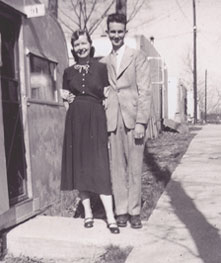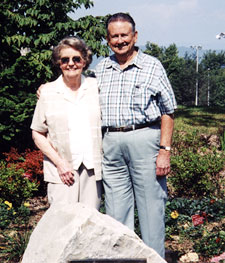The International Peace Garden:
Legacy of war and symbol for peace
by Robert L. Youngs
When Tom Old (electrical engineering '49) returned to Roanoke after serving in
the 246th Coast Artillery during World War II, he wanted to take advantage of the G.I.
Bill to study electrical engineering at Virginia Polytechnic Institute*. In the fall of
1946, Old, his wife, Ruth, and their three-year-old daughter moved into one of three
trailer camps established for housing married students, mostly veterans returning from
military service. Camp No. 1 was by the Duck Pond; Camps No. 2 and No. 3 were at
the south edge of campus.
 |
Trailer Camp No. 2, known as Hurricane Hill, in 1949.
|
Old and his family became active members of a community of 76 trailers that today is the hill above the tennis courts on Washington St. Officially designated Trailer Camp No. 2, it was tagged "Hurricane Hill" by the residents, as northwest winds seemed always to be blowing over the site. Old was elected mayor of the Hurricane Hill community and presided over a rich mixture of activities as the returned veterans, serious students anxious to move into peacetime careers, shared common interests and goals. Concrete walks between the trailers and plantings of daylilies helped make the trailer camps pleasant, livable communities. A distinctive landmark was a large, white oak tree, with a trunk about three feet in diameter, located at the corner of the camp.
 |
 |
Sandy and Bill Dawson in front of their trailer in 1949.
|
Sandy and Bill Dawson at the International Peace Garden in 2001.
|
Another Hurricane Hill resident, Bill Dawson (agricultural education '49),
who had served in the Philippines with the 11th Airborne Division, lived with
his wife, Evelyn (Sandy) Dawson, in the trailer court from January 1949
through June 1950. According to the Dawsons, the $25-a-month rent for their small
trailer included electricity and water, but they
had to buy gas for the cook stove and
oil for the heater. Larger trailers met the needs of couples with children, such
as the Olds. Separate trailers provided bath and laundry facilities and an
adjacent house ("The Big House") served as
a community center, with a small store for
purchasing groceries and fuel for
the stove. Gatherings for canasta were a regular source of recreation and
sociability. The trailer courts provided communities where married veterans could
share their experiences and get on with their lives, say the Dawsons.
By the early 1950s, more suitable housing began to be available for
married students. The three trailer camps were closed and the trailers removed.
New construction buried the site of Trailer Camp No. 3. Only the concrete paths,
the plantings of daylilies, and the oak tree remained on Hurricane Hill as a legacy
of the hectic post-war years. Brush, trees, and weeds gradually took over the
site. Nearby remained the Cranwell residence that would later become the
Cranwell International Center (CIC).
Forty years later, the Montgomery County Rotary Club and Virginia
Tech started to make plans for the site of the former Hurricane Hill, unaware of
its historical background. The Rotary Club, which is active in international
service projects in many parts of the world, has a close association with the CIC and
the many international students who come to Virginia Tech from all corners of
the world. Out of this relationship came the concept of a peace garden to honor
the international community and to provide a symbol of the groups' commitment
to advancing international understanding.
In April 1994, the International Peace
Garden was dedicated to
international peace and understanding as a
cooperative effort of Rotary, the CIC, and the
Council of International Student Organizations. In May 2001, a permanent bronze plaque
was installed as graduating students from many countries joined in rededicating
the garden to the mission of international peace.
The garden features plantings chosen not only for their beauty, but also for
their ties to parts of the world that have been ravaged by war and are now peaceful
or struggling for peace. Bosnian pine, cedar of Lebanon, Korean dogwood,
Chinese holly, and Japanese fir began growing peacefully side-by-side, along
with Douglas-fir, Colorado blue spruce, and eastern hemlock from the United
States. Flowers that originated in Asia, Africa, Central and South America, and
Europe were planted as reminders of the
beauty that peace can bring to the world. Memorials to international students
or members of their families as well as honors to those active in promoting
international peace and understanding were
contributed by interested persons and
organizations. Roses blooming in the sun honor the
memory of a Mexican-student
couple's young daughter, Anamilena Conte, who loved flowers before her untimely
death. And a spruce tree growing toward the sky honors the memory of Chen Lian,
a Chinese graduate student who was killed in California just as his career
was beginning.
The connection between the site of the peace garden and that of Trailer
Camp No. 2 was established after the discovery of the camp's concrete walks, daylilies
that still survived, and tools and other artifacts from the trailer camp days. The large
oak tree that had marked a corner of the camp was now four feet in diameter. Planners
of the peace garden supplemented the existing paths and daylilies with
new walkways and additional plantings.
In fact, when former Hurricane Hill resident Tom Old first visited the site of the garden with his wife, they found "a very distinguishable landmark that told us we were nearing the exact location of the trailer we lived in for three years." It was the same sidewalk that had stretched through the camp, passing in front of their trailer, he says. "As we proceeded down the sidewalk, it was as if we were walking on hallowed ground--and the memories of yesteryear welled up." Old thinks the site of the garden is appropriate. "I believe that the
memorial serves as a complement to and an expression of gratitude for the effort
toward peace by not only the veterans who attended Virginia Tech but also to all
the veterans throughout our great country."
Bill and Sandy Dawson visited the International Peace Garden last
summer. Sandy says they "were pleased to
learn about the garden, a visible symbol of the need to work for peace and justice in a world so often torn by strife." She
adds that she is grateful that her husband knew about the garden before he died
in January. "During his lifetime, he was a dedicated supporter of causes that
worked for peace. The fact that the International Peace Garden is located on the site of
the trailer camp for married veterans where we once lived makes it even
more meaningful to me."
Seven years of dedicated work have provided a place of peace and
reflection on a busy university campus, with the concrete paths and daylilies of the
trailer court still present as a reminder of the days of struggle, hope, and
international understanding that must precede a
durable world peace. The residents of Hurricane Hill, having seen war firsthand,
would have longed for such peace.
Robert L. Youngs is professor emeritus of forestry and forest products at Virginia
Tech and a member of the Montgomery County Rotary Club.
|

